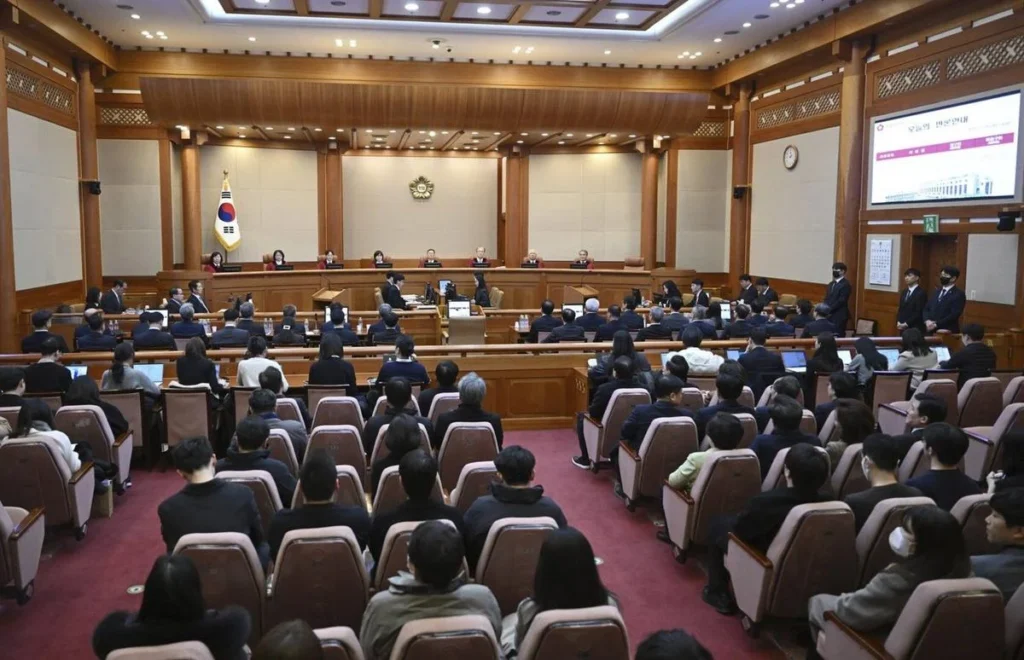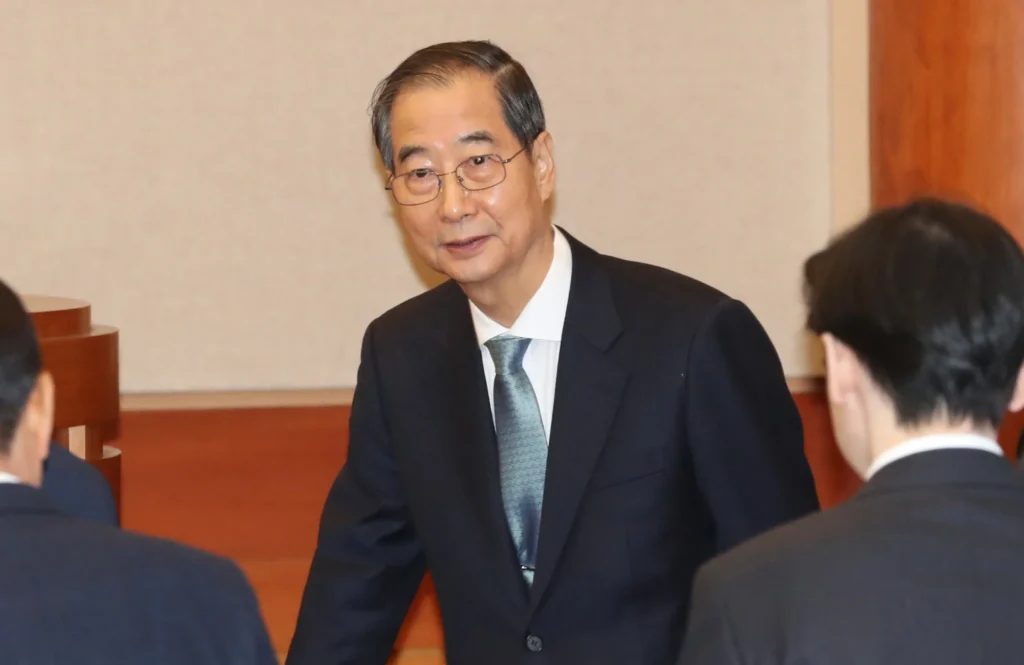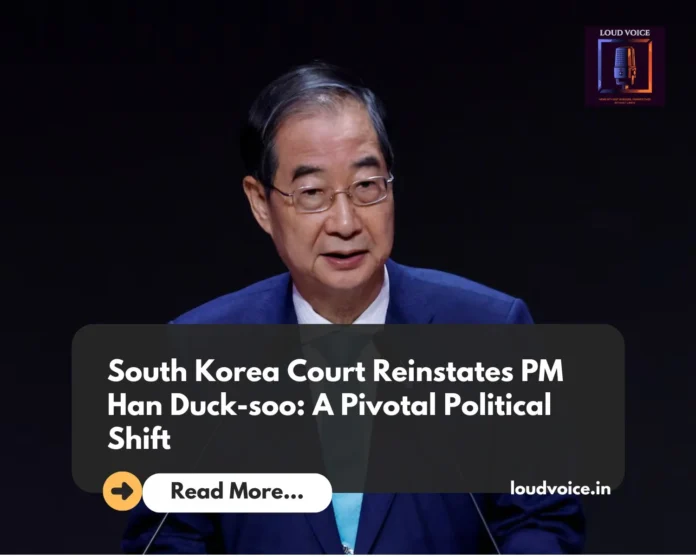South Korea Court Reinstates PM Han Duck-Soo: Overturns Impeachment
South Korea’s Constitutional Court has dismissed the impeachment of Prime Minister Han Duck-Soo, reinstating him as the acting president. This ruling marks a significant turning point in the nation’s ongoing political turmoil, which began when President Yoon Suk Yeol was suspended from office. The decision is expected to have profound consequences for the country’s governance, legal framework, and public sentiment.
The Chain of Political Upheavals
The crisis originated in December, when President Yoon was impeached by parliament following his controversial attempt to declare martial law. This drastic move was seen as an effort to consolidate power amid mounting political opposition. In his absence, Han was appointed as the acting president. However, his tenure lasted a mere two weeks before he too faced impeachment by lawmakers, a situation that added another layer of instability to the government. Since then, Deputy Prime Minister Choi Sang-mok has been overseeing the government’s operations in a temporary capacity.
South Korea’s political climate has been highly volatile, with continuous power struggles and legal battles shaping its governance. The reinstatement of Han now raises pressing questions about the country’s leadership stability and future governance. Observers note that this decision could either restore order or intensify existing divisions within the government and the public.
The Controversial Decision That Led to Han’s Impeachment
Han’s removal was largely driven by his decision to block judicial appointments to the Constitutional Court—an action that opposition lawmakers viewed as an attempt to influence the ongoing impeachment case against Yoon. This move led to a swift parliamentary vote to impeach Han, further plunging South Korea into political disarray. The opposition had hoped that new judicial appointments would tilt the scales in favor of confirming Yoon’s impeachment, making Han’s actions a direct political flashpoint.

However, the Constitutional Court, in a 7-1 ruling, has now deemed Han’s impeachment unjustified, reinstating him as the acting president. Legal experts suggest that this ruling underscores the independence of the judiciary and its role in maintaining checks and balances within the government. Some opposition figures, however, argue that the decision sets a dangerous precedent for future impeachment cases.
Han’s Response and the Road Ahead
Following the ruling, Han expressed gratitude and stated that he thanked the Constitutional Court for its wise decision and would work to bring the government to order. His reinstatement comes at a time when the nation is grappling with deep political divisions and widespread public protests. Han has since pledged to prioritize stability and restore confidence in the administration, though critics remain skeptical about his ability to unify the nation.
Analysts suggest that Han’s immediate challenges include addressing economic concerns, stabilizing diplomatic relations, and ensuring that the judiciary remains independent despite ongoing political pressures. His leadership will be scrutinized closely, both domestically and internationally, as South Korea navigates through this turbulent period.
What’s Next for South Korea?
The political uncertainty is far from over, as the country now awaits the final verdict on Yoon’s impeachment. While parliament has already suspended Yoon, the decision will only be made permanent if upheld by the Constitutional Court. If overturned, Yoon will immediately resume his presidential duties, potentially triggering another wave of political unrest.
With no date yet set for the court’s ruling, tensions are running high. Mass protests have erupted in Seoul, with hundreds of thousands of citizens voicing their opinions on both sides of the issue. Supporters of Yoon argue that his impeachment was politically motivated, while his critics insist that his actions warranted removal. Law enforcement agencies have been placed on high alert as demonstrations continue to swell in size and intensity.
Additionally, the legal arguments in Yoon’s case are expected to be even more contentious than those in Han’s case. Constitutional scholars suggest that the court’s ruling on Yoon will set a significant precedent for how executive power is interpreted in South Korea’s democratic system. Should the court rule in Yoon’s favor, opposition lawmakers may face a political setback that reshapes the balance of power in the coming years.
Implications for South Korea’s Democracy

The ongoing crisis has raised concerns about the resilience of South Korea’s democratic institutions. While impeachment proceedings are a legitimate part of the constitutional process, the frequency and political nature of these recent cases suggest deeper systemic issues. Critics argue that repeated impeachments undermine public trust in elected officials and fuel political instability.
Furthermore, international observers are closely monitoring the situation, as South Korea plays a crucial role in regional geo-politics. The country’s diplomatic relations, particularly with the United States, China, and North Korea, could be affected depending on the final court ruling and the stability of the leadership moving forward. Investors and economic analysts also warn that continued uncertainty may have adverse effects on the country’s financial markets and business environment.
Conclusion
The reinstatement of Han Duck-soo as acting president underscores the volatile political climate in South Korea. As the nation braces for the Constitutional Court’s ruling on President Yoon’s fate, the outcome will undoubtedly have far-reaching consequences. The stakes are high, and the political landscape is poised for further shifts depending on the court’s final verdict.
For now, all eyes remain on the unfolding judicial process, which holds the key to the country’s political future. Whether this decision brings stability or further division will depend on how key political actors navigate the coming weeks. South Korea stands at a crossroads, and the actions of its leaders will determine the trajectory of its democracy for years to come.


